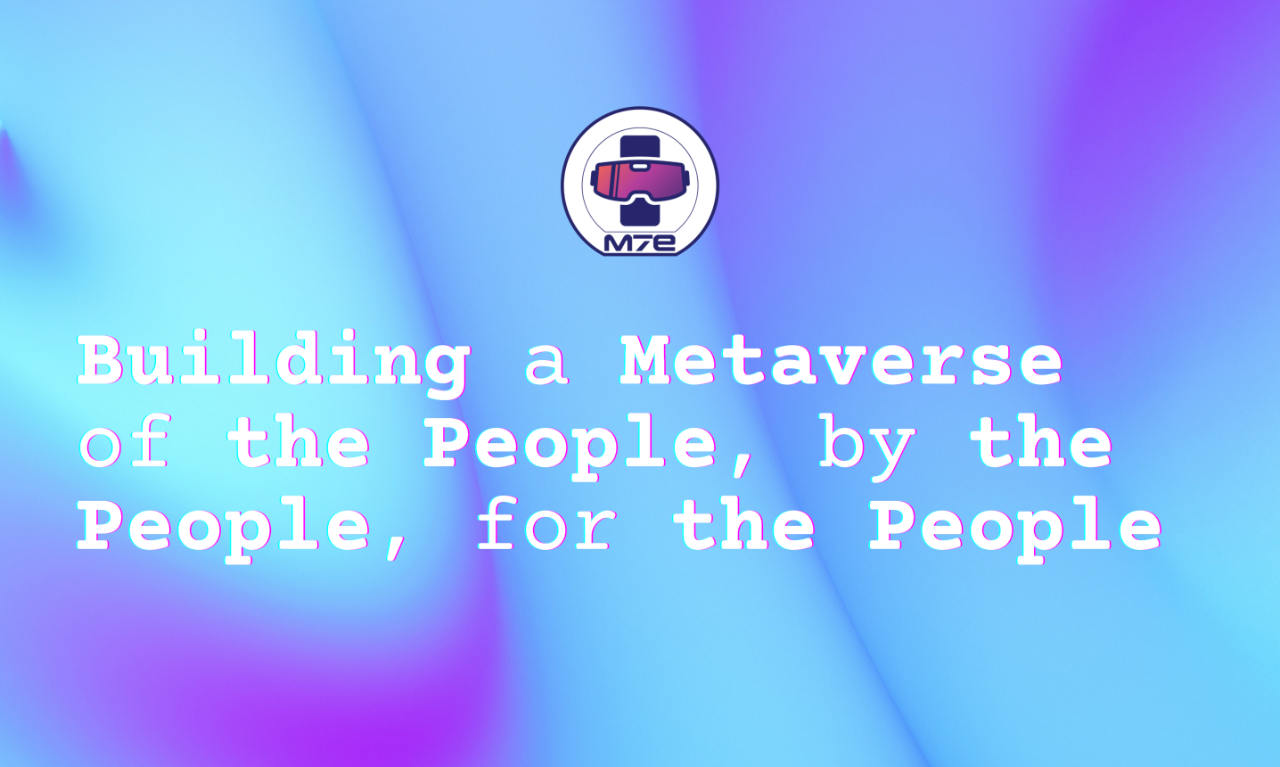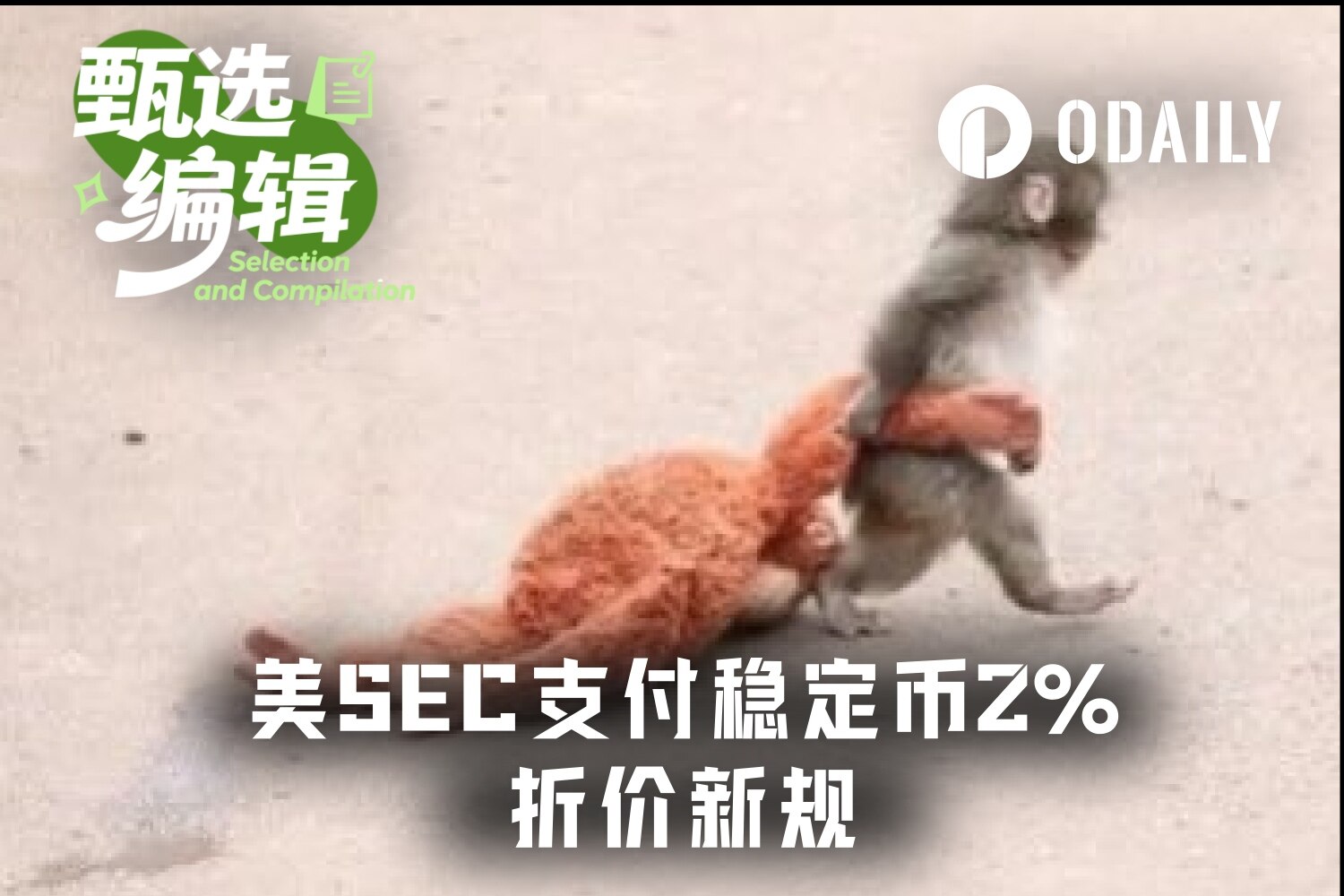谈谈关于区块链游戏的误解和现实
原文作者:Jon Radoff
原文编译:元宇宙特攻队
开发实时游戏的创作者平台 Beamable CEO Jon Radoff 是一名游戏业老兵,他主理的「打造元宇宙」(Building the Metaverse)博客是业内少有的输出元宇宙正见的原创平台。
Jon Radoff 写作此文是想为业界厘清外界对区块链游戏的误解和现实,正确认识区块链为游戏产业带来的革新和边界。
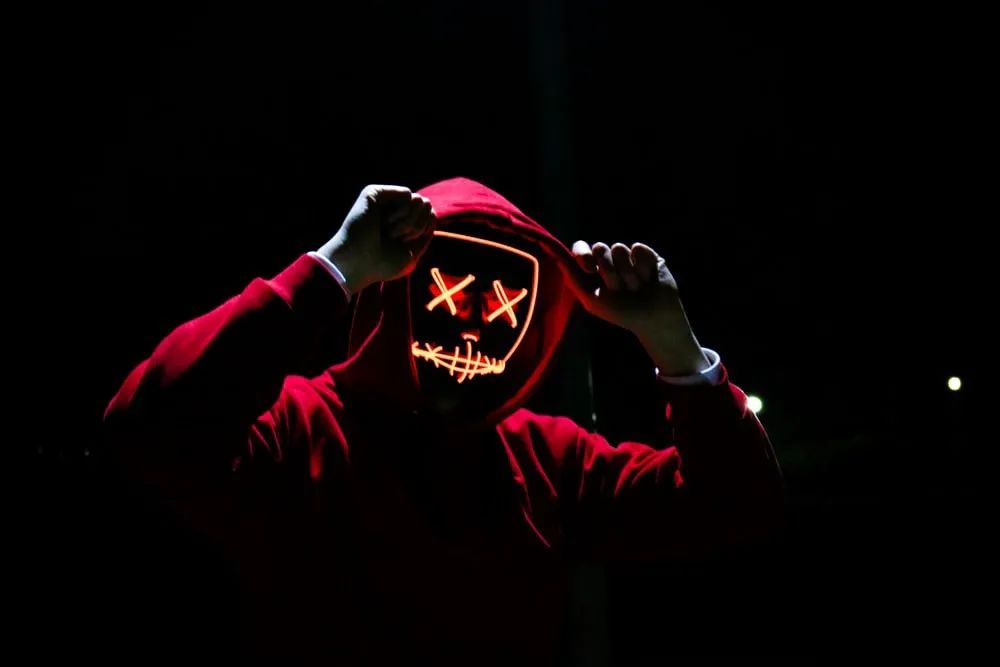
我们看到了全社会对区块链游戏的兴趣呈现爆炸性增长 —— 同时也看到了同样猛增的错误信息、混乱和嘲讽。
我的目的是帮助所有游戏制作者,无论他们想象的商业模式如何。如果有人认真地用区块链建立一个游戏,我一定会支持他们的成功。
我希望在这里分享的主要是给那些可能正在考虑区块链游戏的开发者,以及为任何对该领域的危险和机会感到好奇的人提供一个「幕后」观点。
有些怀疑和嘲讽是理所当然的。我希望在这篇文章中能做到不偏不倚,也能涵盖其中的一些内容。但让我们从一些人似乎拥有的核心信念开始。
1
误解:拥有开放经济的游戏是「邪恶」的
就其核心而言,区块链游戏不过是一种具有「开放经济」的游戏。在有数字游戏之前,你可以买一个棋盘游戏,并在之后转卖它。事实上,在大部分电子游戏历史上,你可以购买一个游戏机、盒子或机器,并将其转卖给任何你想要的人 —— 就像任何其他个人财产。像「魔法:集合」(MtG)和「宝可梦」(Pokemon)这样的游戏是专门围绕我们现实世界的开放经济设计的,玩家最终会交易(是的,投机)单个游戏卡牌。
只是随着最近基于虚拟世界的网络游戏的出现,我们才开始看到游戏的玩法是围绕着封闭经济构建的。例如,大多数「大型多玩家在线角色扮演游戏」(MMORPG)不允许你与其他玩家交易重要物品 —— 大多数手机游戏甚至不允许你交易货币。这是因为这些游戏的体验(和商业模式)完全是基于一个精细调整的成就晋级系统。
区块链是能够围绕游戏实现开放经济的公开可复制账本。它们通过提供透明的、可证明的和基于共识的机制,让游戏通过去中心化市场和交易所来交换虚拟财产,甚至可以为选择合作的一堆游戏之间的可互操作物品提供一个生态系统。
这些游戏将与当前大多数数字游戏不同。
开放经济在伦理和道德上是中立的。现在,如果你想争论资本主义和在市场上交易私有财产的权利是否是错误 —— 那么如果你想,你可以打这场哲学战。但这并不是一场专门针对游戏制作的论战,也不是我在商业化游戏行业里感到有趣的论战。
2
但人们实际上并不喜欢「魔法:集合」的经济
现在,有些人表示,他们实际上也不喜欢像「魔法:集合」这样的开放经济 —— 他们宁愿不要让王牌不断演变,让以前的卡牌组失效。或者说,像黑莲这样的卡牌不应该如此稀缺。辩论任何游戏设计的好处都是完全合理的,尽管我敦促你考虑让一个游戏能够长期持续下去需要什么;除了 MtG 之外,还有很多卡牌收藏游戏已经没人玩了,这通常是因为它们无法长期维持其生态系统。不过,有可能出现一些人不喜欢的设计,并不是让一个开放经济变成邪恶的原因。
虽然开放经济在道德上是中立的 —— 但你不能对一些市场参与者说同样的话,这让我们看到……
3
现实:漂泊流浪
这真的很糟糕,但现在这行当确实有很多江湖骗子。他们骗取人们的钱财,并破坏了许多人诚实、努力工作的局面。
它类似于一些早期的众筹游戏;毫无疑问,如果你已经关注了一段时间的游戏开发,你可以想到一个众筹游戏,得到了一些钱,然后跑路。加密项目的不同之处在于,它们往往在流动性的诱惑下实现了更多的匿名性(即支持者认为他们除了支持他们兴奋的游戏外,还可以退出或投机),这让问题变得更加严重。
最终,游戏的众筹变得不那么流行了,因为有很多游戏都没有得到成功的支持。在某些方面,这是你应该期望发生的事情 —— 游戏开发项目以惊人的速度失败,因为交付一个游戏(更不用说开发一个好的游戏)是如此该死的难做。
出售 NFT 或通证来支持一个游戏,本质上是区块链上的一种众筹形式,所以它增加了与无意建造的坏人打交道的风险。
也就是说,我认为你不应该排除通过 NFT 或通证销售来支持你喜欢的游戏。但要学习我们所有人在币圈早就学到的东西:做一些尽职调查,了解他们的经验是否与他们的雄心相匹配。好的游戏开发团队并不害怕将他们的声誉置于检视之中。
实际上,有可能出现值得支持的化名团队 —— 通常情况下,他们作为创作者在较长时间内赢得了声誉(并且能够通过像推特这样的公开发帖平台验证他们的身份)。他们的声誉对他们来说也是非常有价值的。
而如果你支持一个项目的原因是投机 —— 而不是你在游戏体验中可能获得的乐趣 —— 那么要意识到这是非常危险的。
买家要注意:你在投资一个团队和他们的执行能力,并在一个创意企业中走到一起。当它是一个游戏时,它很可能会失败……所以你的期待应该包含这一可能。但不要让自己被骗被剥削,相信欺诈只是一个失败的项目。如果这个团队想要你的钱来实现他们的梦想,那么就让他们把他们的声誉押在上面。
4
误解:生态环境影响
令人惊讶的是,这种说法继续在游戏方面流传,但这意味着人们并没有真正理解游戏和数字艺术市场之间的差异 —— 或者说区块链技术在过去短短一年里发生了怎样的变化。
首先,有两种主要的区块链算法:工作证明(PoW)和权益证明(PoS)。PoW 需要解决大规模的密码学谜题以达成共识,比特币和以太坊主网就是使用这种算法。它需要消耗大量能源来完成这些操作。
区块链游戏不是建立在比特币或以太坊主网上。大部分游戏是在 Solana、Avalanche、Hedera、Polygon 和 Immutable X 等权益证明类区块链上构建的。PoS 并不比任何其他基于云计算的服务需要更多的能耗,比如你现在正在阅读网上任何东西的后端技术。游戏在这些链上建设是出于务实的原因,包括减少能耗,以及小额支付微交易的高吞吐量和更快的区块链共识终局性。
事实上,如果要看一个受欢迎的游戏的总能量利用率:那么你的玩家在前端的 GPU 所消耗的总能量最终将比 PoS 后端微不足道的能量消耗大几百万倍。
如果你想批评像比特币这样的工作证明算法,或者 NFT 的其他非游戏应用(如数字艺术收藏品,确实大部分在以太坊主网上运行),那么这很好 —— 只要意识到它与今天正在建立的游戏没有关系。
一个需要考虑的问题是:如果这是让你担心的一个方面,而所有这些关于使用 PoS 的游戏的新闻对你来说都是新的 …… 是否有可能区块链游戏的其他方面被你过早地驳斥或重新传播?
5
现实:早期项目经常看起来很糟糕
让我们把话说清楚:游戏开发是一门手艺。这意味着它取决于不断的完善、学习和迭代。
在一个新市场、新商业模式或新流派的最早阶段,几乎没有什么东西看起来是完美的。
即使是今天非常流行的游戏,在其最早的一些原型中看起来也非常糟糕。
现在,我们已经看到了很多垃圾。就像电脑主机游戏和手机游戏里有很多垃圾一样。垃圾并没有什么错。每个人都需要学习。随着时间的推移,我们会看到改进。目前存在的垃圾并不是对区块链的控诉;事实上,我知道有几款正在开发的游戏具有三 A 级的品质 …… 当然,这些游戏需要最长的时间才能推向市场。
6
误解:「NFT 只是链接」
「使用 NFT,你并不真正拥有任何东西,你只是在一个账簿中拥有一个通证,它指向某处某个随机服务器中的一个 JPG 格式文件。」、首先,「随机服务器中的 JPG」适用于数字艺术收藏品。它与游戏发生的情况并不特别相关。这对它在艺术市场上的意义也有点不公平,但这是另一篇文章的讨论。
以下是区块链对游戏的作用:它保留了游戏经济的状态和交易历史(通常用 JSON 片段来完成,这是一种序列化这种数据的好方法)。
个人游戏将决定如何解释区块链中的数据。这包括决定阻止他们不喜欢的物品利用。这意味着,是的,许多游戏公司将可能被卷入到阻止通过行为不良者钱包的物品使用等事情中。
你「拥有」它吗?我们在这里进入了一个有点哲学的争论:但如果「拥有」意味着你有一个代理可以决定是否为另一个资产或通证与第三方进行交易处置 —— 那么是的,你「拥有」它。你拥有它,就像你拥有一张你选择卖给另一个人的「魔法:集合」卡片一样,即使你不拥有卡片作品本身的版权。它所印制的纸质卡片与区块链上的通证并无太大区别。
如果你带着黑莲出现在「魔法:集合」比赛中,你会被允许在每个回合中使用它吗?不会,因为他们会制定规则,规定你可以和不可以使用你的牌。如果你偷了黑莲花并被发现,你会被终生禁赛吗?很有可能(除了其他法律指控外)。建立在区块链上的游戏可以做同样的事情。同样,区块链所促成的是具有开放经济的游戏。
7
半真半假:如果 NFT 指向的服务器离线,你就会失去 NFT
一个 NFT 有可能指向服务器上的一个 URL,如果该服务器消失了,那么 NFT 的内容就消失了。然而,该 NFT 所代表的内容所有权保持不变。
有替代中心化服务器依赖的方法。例如,基于区块链的存储系统,如 Arweave 提供了永久的去中心化存储,它不依赖于服务器是否保持运行。
游戏的更深层次的问题是,服务器问题更加复杂:毕竟这是一个游戏服务器 —— 不是简单的文件存储。而这确实带来了更多的复杂性。由于我们还没有看到区块链游戏变得流行然后关闭的整个生命周期,我们不能确定这在所有情况下会如何发展。但它有几种可能的发展方式,并不完全是负面的:
即使游戏消失了,也可以有某种装扮或奖杯柜连续性的游戏内容,这些内容将活在游戏之外(我在下面有更多关于这个话题的讨论,因为它本身是有争议)。已经有一些基于 NFT 的展示厅和画廊出现了,它们正是为了做到这一点 —— 可互操作的、合作的游戏网络也可以提供比纯粹装扮更多的东西。
游戏服务器可以开源,提供一种延续性的手段,只需继续在区块链内的同一经济体里运行。
社区可以建立自己的游戏客户端和/或游戏服务器,从而让游戏继续(假设对 NFT 的许可没有阻止,而且所有者有意在游戏下线后也要执行)。
事实上,后一种情况表明了一个创新的领域:数字收藏品优先的游戏公司,它专注于创造游戏经济,并向社区开源其游戏 。
8
现实:开放经济游戏与封闭经济游戏不同
人们经常指出,以前的游戏是如何尝试半开放经济(例如「暗黑破坏神 3」中没成功的拍卖行)并且失败了。他们通常似乎不记得有像「魔法:集合」这样的开放经济的游戏存在。
问题是:具有开放经济的游戏需要有不同的游戏设计。他们中的大多数不会通过在封闭经济的 MMORPG 上安装开放经济(区块链)而取得成功。虽然有几个例外,但大多数试图从订阅制到免费游戏的 MMORPG 都因为类似的原因而失败 —— 游戏设计过于依赖商业模式。
这些新游戏会是什么样子?我们还不完全知道。一些最早的成功者似乎从「魔法:集合」这样的卡牌收藏游戏,或从有土地经济的开放世界游戏(如第二人生)中吸取了很多经验。我期待人们进行实验,会有很多惊喜。游戏开发是一门手艺。
9
误解:现有的技术可以更好地解决这个问题了
通常的说法是,我们有数据库技术,比区块链更快、更可扩展、更具性能。虽然这绝对是事实,但这并不是区块链所解决的问题。
它所解决的问题是给人和应用的生态系统提供相互交换价值的能力,而不需要中心化看门人。
在区块链之前,创建开放经济的主要解决方案需要一个中心化的服务来提供 API 供所有参与者使用。即使你相信这些服务会永远可靠地运行,你也会得到一个枢轴式中心化模型,每个人都可以建立在相同的经济上。这存在于《第二人生》和他们的 Tilia 支付平台,以及今天 Steam 上的有限程度。
「但是,各种经文系统,比如乔治·普尔曼创建的经文系统,过去不也是这样做的吗,而且还把所有人都炸死了?」
不,那是一个中心化的价值交换系统,而不是一个去中心化系统。它依赖于一个中央机构的可信度和控制。事实上,这正是许多人喜欢去中心化的主要原因之一。
中心化系统在结构上是枢纽和辐条式的。这意味着每个游戏都是围绕着一个单一服务的钩子建立的,在那里你不断地把所有的交易通过他们发送接收。这些网络在本质上更受限制。
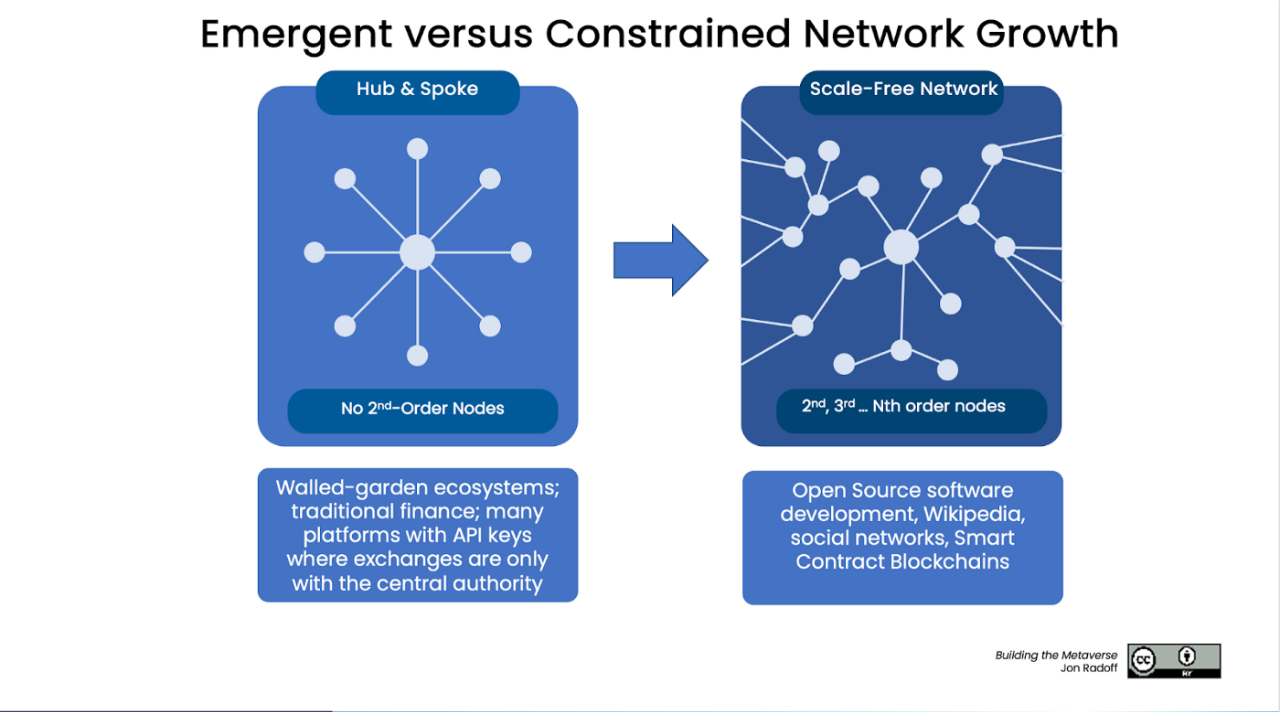
就游戏而言,区块链允许创作者利用去中心化市场、交易所和其他他们不需要自己开发的应用代码 —— 而且不需要向发行商申请参与的权利。每当你需要依赖某种中心化服务(如发布和销售你的游戏或其游戏中的物品),你就给了他们为服务榨取高额租金的能力。你也会受制于他们关于什么是对和什么是不允许的奇思妙想。区块链的目标是实现无许可开发,小团队可以有大梦想 —— 依靠一个不断增长的生态系统,他们不需要自己建立。
事实上,有一些全新的方式,游戏将能够通过修改甚至是开源他们的客户端软件来扩展其生态系统。我们已经知道人们喜欢修改用户界面、关卡,或增加功能。(如果你不知道,请看一下「我的世界」和 Terraria 以及你在 CurseForge 上可以找到其他大约十几款游戏)。区块链将修改扩展到包括与经济互动的修改(自定义拍卖行、图表等),以及甚至将游戏玩法外包给社区自己(如 LootProject 正在尝试的)。
把关的结果是繁琐的收租,这将阻碍创新和创意。
区块链在性能方面不如中心化数据库,因为它们需要与所有验证者达成共识。而这就是区块链的力量所在。幸运的是,一些较新的 PoS 区块链有很高的性能,所以这种共识的固有低效率并不妨碍制作一个好游戏。
「但是,去中心化经济不就意味着一个什么都能做的狂野西部吗?」
不,每个游戏仍然可以选择它希望如何解释来自区块链的数字资产;可以通过检查物品的出处并确保它们来自某些钱包来核查其真实性。作为欺诈性销售对象的物品可以被冻结。物品可以用自己的游戏属性进行实例化,并进行修改以适应不断发展的游戏系统(就像影响「魔法:集合」中黑莲花的规则随时间变化一样)。
在更开放的生态系统中,各游戏世界之间具有互操作性,没有什么能迫使一个世界以与新世界的意图相冲突的方式显示或使用一个物品。
10
半真半假:新平台只是重新中心化了 NFT
这是一个合理的担忧。这种批评通常是针对 OpenSea 的:基本上就是「新瓶装旧酒」—— 他们正在创建一个新的中心化生态系统,人们依靠它来购买/出售他们的数字资产。而且他们也开始引入规则,允许他们控制销售过程,甚至冻结资产。
如果以 eBay 为例,在线拍卖平台确实成为(大部分)赢家通吃的市场。
像 OpenSea 这样的平台吸引了很多人的眼球。它们的价值不仅在于它们提供的效用,而且在于它们利用的受众规模。由于卖家的目标是获得最多的出价,所以它确实自然地倾向于最大的平台。从这个意义上说,与 Web2 没有太大的区别。
还应注意的是,品评者和策展人将继续发挥作用。从本质上讲,OpenSea 目前是最大的策展方。但也有像 SuperRare 这样的策展方,它们专注于特定类型的内容,我们将有可能看到同样的情况发生在游戏中。
然而,NFT 的基本结构是这样的,将资产从一个销售平台转移到另一个平台的能力的摩擦要小得多。我们已经看到,像 LooksRare 这样的新平台可以快速替代 OpenSea 这样的平台。我相信我们也会看到完全的链上拍卖系统的出现,这有可能在整个生态系统中聚合拍卖 —— 实现最大的拍卖出价,而不要求每个人进入同一个拍卖行。
现在宣布在市场生态系统中取得任何全面胜利还为时过早。我怀疑它将比早期的成功所表明的更有活力和竞争力,但只有时间会告诉我们如何展开。
11
半真半假:游戏玩家不喜欢 NFT
他们对 NFT 肯定会有所反弹。
这是典型的创新者困境:在现有业务的基础上增加一个新的商业模式,有着疏远现有客户的高风险。这就是育碧最近遇到的问题,也是「星球大战前线」在试图在高端游戏的基础上增加免费游戏元素时遇到的问题。
部分原因是品牌问题 —— 不幸的是,由于与游戏的生态环境影响有关的误解,以及由于现实中有利用天真人的坏人(犯罪分子)存在,NFT 已经获得了负面的声誉。
虽然有一群声势浩大的玩家不希望看到 NFT 添加到他们的游戏中,但似乎也有很多玩家接受这个想法。
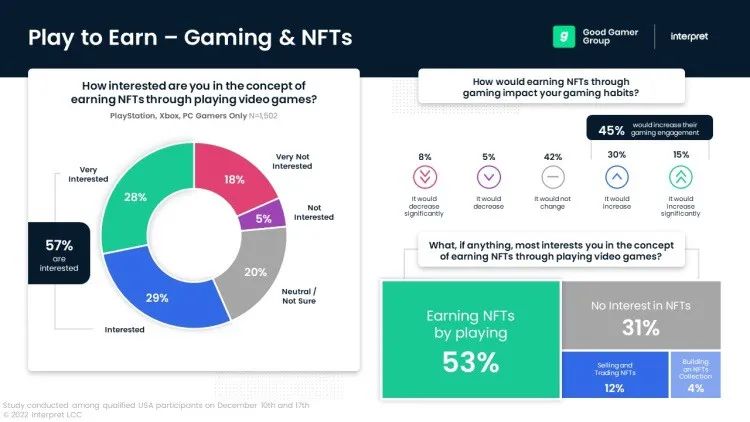
现在,对上述研究有一些批评意见:调查的选择标准偏向于大量「感兴趣」的玩家。这是因为调查的选择标准要求人们要么拥有或曾经拥有 NFT,要么听说过它们。我们可以假设,仍然有大量的人不知道 NFT 是什么(或者不确定,以至于他们说不知道)。因此,也许在游戏者人群中,对这个想法感兴趣的人比 53% 少得多。然而,这并不排除有证据支持有相当一部分玩家能够接受它。即使只有 1%,人们也可以围绕它建立一个完整的产业。
我希望我们看到的是 —— 正如使用 NFT 的游戏将是新的游戏设计类型 —— 它们也将吸引不同于普通三 A 级游戏玩家的受众(就像过去的免费手机游戏开辟了全新的细分市场)。
12
误解:所有的 NFT 都将具有互操作性
这里的核心思想是,我们将有能力购买代表一个游戏中的物品的 NFT,该物品在另一个游戏中具有某种效用。
有时,困惑在于,人们声称这意味着所有的 NFT 都将提供互操作性。
有些会,有些不会。在他们这样做的情况下,他们可能会被限制在某些游戏世界和化身系统。其中一些将是单一的世界,一些将是合作世界的星系,有时它将是由共同的化身系统联合的大型网络。
互操作性确实有很多挑战。当我们谈及互操作性时,实际上有几个问题。
行为:在不同的世界里,事物的运作方式可能不同
意义:事物在不同的世界里可能甚至意味着同样的事物
演示:不同世界之间的事物需要有不同的外观
持久性:保留跨世界的经济核算
连接性:世界之间的通信和网络
区块链实际上只解决了「持久性」的问题。它在设想多方互动而不需要中心化收租机构的情况下相当擅长(合作的世界、可互操作的市场、画廊、经济应用等)。
其他层要么需要人们合作(就事物的呈现方式、含义或行为达成一致),要么可能存在默认/未定义的行为、含义和呈现方式。
13
误解:玩家不关心互操作性
有时,这更多是作为一种商业批评被指出:即与 NFT 的互操作性是一种寻找问题的解决方案。玩家们不会在意。或者说,这将是一个糟糕的实现,人们不会喜欢它。
我们已经在有围墙的花园生态系统中实现了互操作性。例如,「第二人生」—— 尽管有关于其消亡的夸张报道 —— 仍然有一个繁荣的经济,其中创造者们相互建立内容,并将其从一个地方带到另一个地方。这种情况在「我的世界」中大规模发生,它也发生在 Roblox(截至 2021 年底,月活跃用户数超过 2.5 亿),它现在正发生在 VRChat 中。长久以来,我们在「魔兽世界」、「梦幻西游」等游戏的修改层面上实现了互操作性,还有很多其他的例子。
因此,我们已经知道,玩家对围墙内的互操作性感兴趣。
我们会看到互操作性发生在具有不同美学的疯狂的世界之间,或具有不同游戏规则的不同世界之间吗?也许不会,但这只是忽略了将你的化身从一个世界带到另一个世界的兴趣,因为在更多的社会环境中已经发生了 —— 以及在合作游戏世界的之间。
区块链所做的一切都是为了实现一个开放的经济。我想不出有什么理由,如果人们在封闭的经济中想要互操作性,他们就不会想要开放经济中的互操作性。
14
未知:NFT 有游戏之外的生活
有时,区块链的倡导者说,NFT 的价值将超越游戏的寿命。
通常,这种寿命表现在两个层面上:
游戏蓬勃发展时,对另一玩家的转售价值
一旦游戏不再运作后的保留价值(即「收藏」价值)。
我们知道,玩家已经有了转卖游戏财产的愿望 —— 无论是允许的(像「魔法:集合」这样的公开市场游戏)还是非法的(利用「魔兽世界」的第三方市场)。像 Axie Infinity 这样的游戏是否能够保持这个飞轮的旋转,将取决于他们是否保持足够高的长期游戏乐趣,以继续吸引玩家。像这样的游戏可能还有空间,就像一些经久不衰的卡牌收藏游戏也有空间一样(作为数字产品,你会认为由于更高的可用性、可触及性和丰富的选择,空间会更大)。
一旦一个游戏不再存在,物品的实用价值就会消失,只有亲合力的价值。
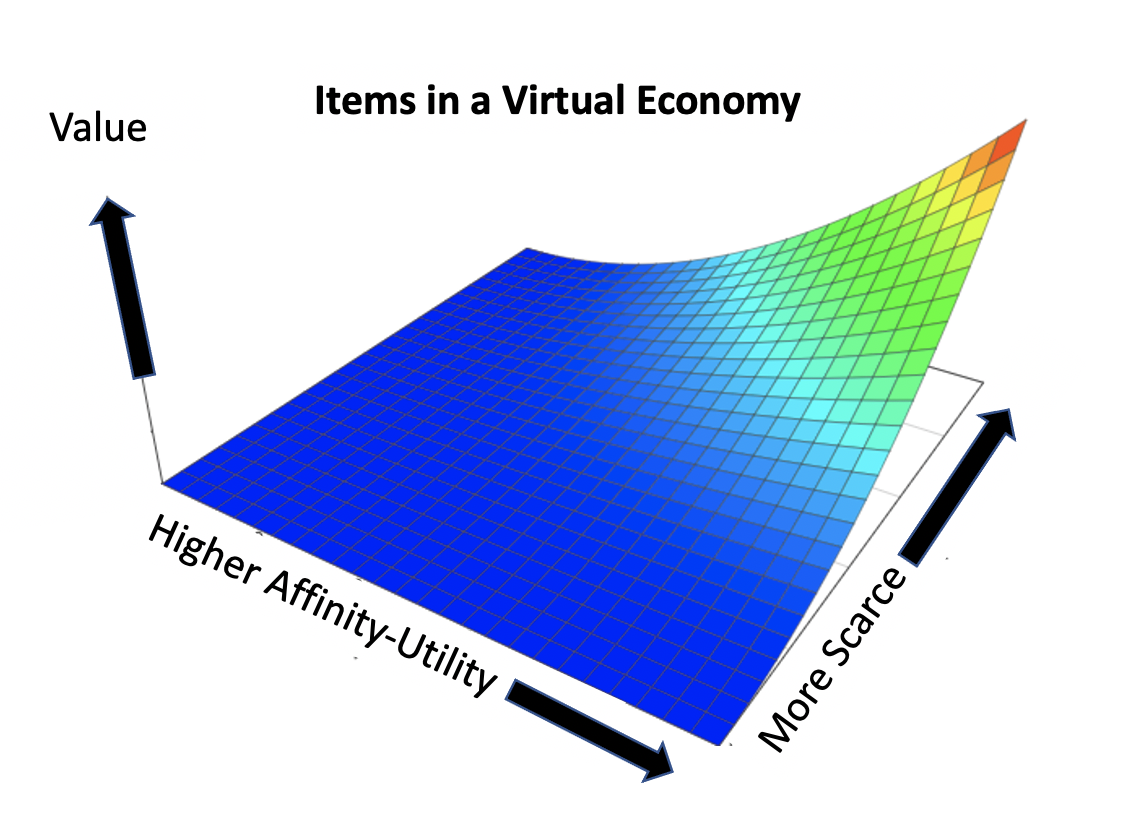
这意味着,一旦一件物品不再作为可玩的物品使用,你会看到它的价值下降…… 但这并不意味着它失去了所有的价值。
就我自己而言,在我过去玩过的一些游戏中,我希望自己能从游戏体验中保留一些数字收藏品。我不知道是否有足够多的人关心这个问题。
我不知道这些收藏品的长期价值会是什么。没有人知道。但我确实知道,收集东西并不新鲜,很多人都想这么做。
也许会有一些互操作性的案例,在这些案例中,游戏之间进行合作,并且有比简单的收藏价值更多的效用。同样,这也是一个未知数 —— 时间会告诉我们这对生态系统有多重要。
